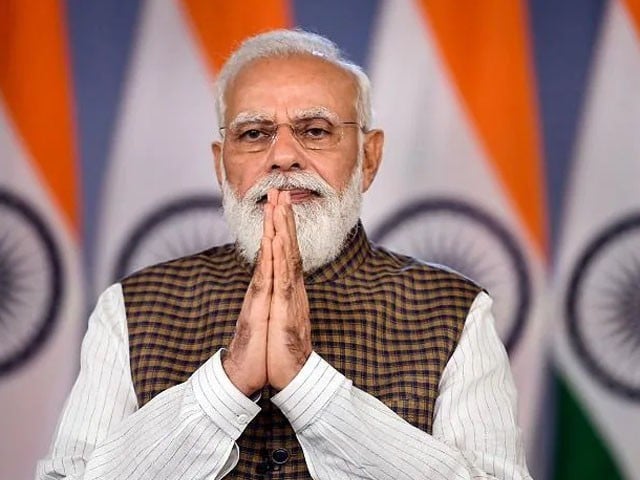Abdullah Kamaran
The territorial dispute over Kashmir has been a bone of contention between India and Pakistan for decades. Recently, India has been exacerbating the situation by making paranoid claims about Azad Jammu & Kashmir, flagging the volatility in the region, and calling for a permanent solution to the dispute in Indian Illegally Occupied Jammu & Kashmir. While the issue of Kashmir has always been a sensitive topic in India, the timing of this rhetoric is particularly significant, given the upcoming general elections.
In the lead-up to the elections, some of the ruling BJP’s top leaders have been using inflammatory language to whip up anti-Pakistan sentiment. This is not a new phenomenon, as the pro-Hindutva party has long capitalized on venom and othering to win support and marginalize Muslim citizens. By taking a hardline stance on Jammu & Kashmir, the BJP is furthering its agenda of portraying itself as a strong, nationalist party that is tough on Pakistan.
This type of rhetoric is not unique to the BJP, however. In fact, all major political parties in India use foreign policy issues as a way to garner support and win votes. The issue of Pakistan and the unresolved Kashmir dispute are particularly potent in this regard, and politicians on both sides of the aisle engage in war-mongering and jingoism in order to appeal to voters.
In the current election cycle, however, the rhetoric coming out of India has been particularly aggressive. The foreign and interior ministers have gone so far as to claim India’s right over AJK, which is a clear provocation to Pakistan. The ministers are also trying to sell the theory that Kashmiris are not happy being part of Pakistan, which is a baseless claim that is not supported by the facts on the ground.
While India’s rhetoric may be unsettling to Pakistan, it is important to keep things in perspective. Indian elections are notoriously volatile, and foreign policy issues often take a back seat to domestic concerns once the votes are counted. That being said, the situation in Kashmir is a serious one that requires a nuanced and thoughtful approach.
India would be wise to focus on finding a permanent solution to the Kashmir dispute that respects the wishes of the locals and promotes peace and stability in the region. This will require a willingness to engage in dialogue with Pakistan and to consider alternative approaches to the problem. Ultimately, a shift towards a more cooperative and constructive relationship between India and Pakistan will benefit both countries and the people of the region as a whole.
The territorial dispute over Kashmir has been a longstanding issue between India and Pakistan, and it has been a bone of contention between the two countries for decades. The issue has become more complicated due to the domestic politics of India, where the ruling party has been using the issue of Kashmir to gain political mileage.
The Kashmir issue dates back to the partition of India in 1947 when the princely state of Jammu and Kashmir was given the option to join either India or Pakistan. The ruler of the state, Maharaja Hari Singh, decided to remain independent. However, in October 1947, Pakistani tribesmen invaded the state, prompting the Maharaja to accede to India. The Indian government sent troops to the state, and since then, the region has been disputed between India and Pakistan.
Over the years, the issue has become a sensitive topic in India, and political parties have used it to garner support and win votes. However, in the lead-up to the 2024 general elections, the ruling Bharatiya Janata Party (BJP) has taken a particularly aggressive stance on the issue.
The BJP, which is a pro-Hindutva party, has long capitalized on venom and othering to win support and marginalize Muslim citizens. By taking a hardline stance on Jammu & Kashmir, the BJP is furthering its agenda of portraying itself as a strong, nationalist party that is tough on Pakistan.
In the current election cycle, the rhetoric coming out of India has been particularly aggressive. The foreign and interior ministers have gone so far as to claim India’s right over Azad Jammu & Kashmir (AJK), which is a clear provocation to Pakistan. The ministers are also trying to sell the theory that Kashmiris are not happy being part of Pakistan, which is a baseless claim that is not supported by the facts on the ground.
This type of rhetoric is not unique to the BJP, however. In fact, all major political parties in India use foreign policy issues as a way to garner support and win votes. The issue of Pakistan and the unresolved Kashmir dispute are particularly potent in this regard, and politicians on both sides of the aisle engage in war-mongering and jingoism in order to appeal to voters.
While the issue of Kashmir has always been a sensitive topic in India, the timing of this rhetoric is particularly significant, given the upcoming general elections. In the lead-up to the elections, some of the ruling BJP’s top leaders have been using inflammatory language to whip up anti-Pakistan sentiment.
Despite the aggressive nature of India’s rhetoric, it is important to keep things in perspective. Indian elections are notoriously volatile, and foreign policy issues often take a back seat to domestic concerns once the votes are counted. That being said, the situation in Kashmir is a serious one that requires a nuanced and thoughtful approach.
India would be wise to focus on finding a permanent solution to the Kashmir dispute that respects the wishes of the locals and promotes peace and stability in the region. This will require a willingness to engage in dialogue with Pakistan and to consider alternative approaches to the problem. Ultimately, a shift towards a more cooperative and constructive relationship between India and Pakistan will benefit both countries and the people of the region as a whole.
Therefore, the issue of Kashmir has been a bone of contention between India and Pakistan for decades. The current domestic politics of India have made the issue more complicated, with the ruling party taking an aggressive stance on the issue in the lead-up to the 2024 general elections. However, it is important to keep things in perspective, and a permanent solution to the dispute that respects the wishes of the locals and promotes peace and stability in the region should be the ultimate goal.
















































